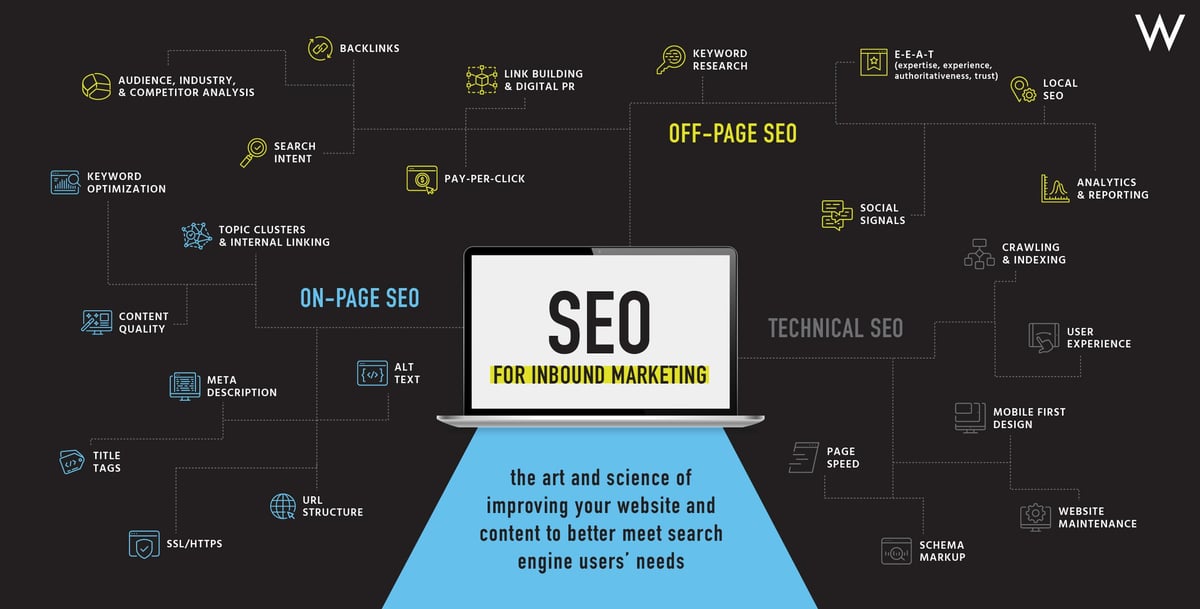Discover the top SEO monitoring tools and techniques that will help skyrocket your website’s performance and increase organic traffic.

Image courtesy of via DALL-E 3
Table of Contents
- Introduction to SEO Monitoring
- Tools to Monitor SEO
- Techniques for Monitoring SEO
- Understanding SEO Metrics
- Improving SEO Based on Monitored Data
- Benefits of Good SEO Monitoring
- Challenges in SEO Monitoring
- Using Feedback for SEO Improvement
- Summary of Monitoring SEO
- Frequently Asked Questions (FAQs)
Introduction to SEO Monitoring
SEO, which stands for Search Engine Optimization, is a crucial practice for websites to improve their visibility on search engines like Google. But simply optimizing a website once is not enough; monitoring SEO is essential to ensure that the website continues to perform well over time. In this section, we will explore why monitoring SEO is important and how search engines play a significant role in ranking websites.
What is SEO?
SEO is like a secret code that helps websites get noticed on the internet. By using specific words and tricks, websites can show up higher on search engine results pages when people search for something online. It’s like making sure your website is wearing bright colors so it stands out in a crowded room.
Why is Monitoring SEO Important?
Imagine you have a favorite book, but no one knows about it because it’s hidden on a dusty shelf. Monitoring SEO is like checking to see if your favorite book is being read by many people. It helps website owners know if their site is popular and if people are visiting it often.
How Search Engines Work
Search engines are like detectives that look for the best websites to show people when they search for something. They use special rules to decide which websites are more important and should be shown first. By monitoring SEO, website owners can understand how these detectives work and make sure their website is always on their radar.
Tools to Monitor SEO
When it comes to keeping track of your website’s Search Engine Optimization (SEO) performance, there are several helpful tools available. These tools can provide valuable insights into how well your website is ranking on search engines and what areas need improvement. Let’s take a look at some of the top tools you can use to monitor your SEO:
Google Analytics
If you want to track the number of visitors coming to your website, Google Analytics is the go-to tool for the job. It allows you to see where your traffic is coming from, which pages are most popular, and how long visitors are staying on your site. This information can help you tailor your content to better meet your audience’s needs.
Ahrefs
Ahrefs is another powerful tool that can assist you in monitoring your SEO efforts. It specializes in checking backlinks, which are links from other websites to yours, and helps you analyze your keyword rankings. By keeping an eye on these metrics, you can see how well your website is performing in comparison to your competitors.
SEMrush
SEMrush is a comprehensive tool that provides insights into your website’s performance, helps you analyze competitor strategies, and gives you data on keyword rankings. By utilizing SEMrush, you can identify areas where you can improve your SEO strategy and stay ahead of the competition.
Techniques for Monitoring SEO
When it comes to monitoring SEO performance, there are several techniques you can use to keep track of how well your website is doing on search engines. These techniques can help you understand where your website stands in terms of visibility and ranking. Let’s explore some essential methods for monitoring SEO:

Image courtesy of www.techwyse.com via Google Images
Tracking Rankings
Checking where your website ranks on search engines like Google is crucial to understanding its performance. By tracking your website’s position in search results for specific keywords, you can determine if your SEO efforts are paying off. There are tools available that can help you monitor these rankings and make adjustments to improve them.
Analyzing Keywords
Keywords play a significant role in SEO as they help search engines understand the content of your website. By analyzing keywords that are relevant to your business or industry, you can optimize your content for better search engine visibility. Tools like Google Keyword Planner can assist you in finding the right keywords to target and monitoring their performance over time.
Audit the Website
Conducting a website audit is an essential technique for monitoring SEO health. A website audit involves evaluating various aspects of your site, such as technical issues, content quality, and backlinks. By identifying and fixing any issues that may be hindering your website’s performance, you can improve its SEO and overall visibility on search engines.
Understanding SEO Metrics
When monitoring SEO (Search Engine Optimization), it’s essential to keep an eye on certain metrics that help you understand how well your website is performing. These metrics provide valuable insights into the traffic your site is getting, how visitors are interacting with it, and what can be improved to boost its visibility on search engines. Let’s delve into some of the key SEO metrics you should pay attention to:
Traffic
Simply put, traffic refers to the number of visitors coming to your website. The more traffic you have, the more people are viewing your content. Monitoring your website’s traffic is important because it helps you understand how popular your site is and whether your SEO efforts are paying off. It’s like knowing how many friends come over to your house – the more, the merrier!
Bounce Rate
Imagine someone knocking on your door and leaving right away without saying hello. That’s similar to what happens when a visitor lands on your website and exits without exploring further – this is known as the bounce rate. A high bounce rate could indicate that visitors are not finding what they’re looking for or that your website is not easy to navigate. It’s crucial to keep an eye on your bounce rate and make necessary adjustments to keep visitors engaged.
Click-Through Rate (CTR)
Have you ever clicked on an interesting link in a school assignment or game? When a visitor clicks on a link to your website from search engine results, that’s your click-through rate. CTR is important for SEO because it shows how appealing your website is to searchers. The higher the CTR, the more people are interested in your content. It’s like having a catchy title for your favorite book – it attracts more readers!
Improving SEO Based on Monitored Data
Monitoring your website’s SEO performance is not only about tracking numbers and statistics; it’s also about using the insights gained to make improvements. Let’s delve into some tips on how to enhance your website’s SEO based on the data you’ve gathered.

Image courtesy of www.weidert.com via Google Images
Fixing Issues
One of the first steps in improving your website’s SEO is to address any issues that have been identified during monitoring. These issues could range from broken links, slow loading speed, or missing meta tags. By fixing these issues promptly, you are ensuring that your website is in good shape for search engine crawlers to index effectively.
Optimizing Content
Optimizing your website’s content is crucial for improving SEO. Make sure your content is relevant, engaging, and includes relevant keywords. By incorporating the keywords that you’ve found to be effective during monitoring, you can boost your website’s visibility in search engine results pages. Additionally, regularly updating and refreshing your content can signal to search engines that your website is active and valuable to users.
Benefits of Good SEO Monitoring
Regular and effective SEO monitoring can bring a host of benefits to a website. Let’s explore some of the advantages that come with keeping an eye on how well your site is performing in search engines.
Better Visibility
When you monitor your website’s SEO regularly, you can improve its visibility on search engines. This means that when people search for topics related to your website, they are more likely to find you. By using the right keywords and optimizing your content, you can increase your chances of appearing at the top of search results, making it easier for potential visitors to discover your site.
Higher Traffic
Good SEO monitoring can also lead to higher traffic on your website. As your visibility in search engines improves, more people are likely to click on your website link and visit your pages. This increase in traffic can result in more visits, more engagement with your content, and potentially more conversions, such as signing up for a newsletter or making a purchase. Ultimately, higher traffic can help your website grow and reach a larger audience.
Challenges in SEO Monitoring
Monitoring SEO, while crucial for a website’s success, can sometimes present challenges that need to be addressed. Let’s delve into some of the difficulties you might encounter and ways to overcome them.

Image courtesy of www.mentionlytics.com via Google Images
Dynamic Algorithms
Search engines like Google frequently update and change their algorithms, the rules they use to rank websites. This constant evolution can make it challenging to keep up with the latest requirements for good SEO. What worked yesterday might not work tomorrow, requiring website owners to stay informed and adapt their strategies accordingly. To tackle this challenge, it’s essential to stay updated on algorithm changes and adjust your SEO tactics to align with the current standards.
Competition
With millions of websites vying for the top spots in search engine results, competition in the digital landscape is fierce. Competitors are continually optimizing their websites and content to improve their SEO rankings, making it harder for others to stand out. To address this challenge, it’s crucial to analyze your competitor’s strategies, identify areas where you can differentiate yourself, and continuously refine your SEO tactics to stay ahead in the race. Monitoring your competitor’s activities and staying flexible with your approach can help you navigate the competitive SEO environment more effectively.
Using Feedback for SEO Improvement
One way to improve your website’s SEO is by gathering feedback from your users. User feedback is valuable because it helps you understand what your audience likes and dislikes about your site. You can collect feedback through surveys, comments, or even by analyzing user behavior on your website.
Implementing Feedback
Once you have gathered feedback from your users, it’s essential to use this information to make improvements to your website. For example, if users consistently complain about the slow loading speed of your site, you can work on optimizing your pages for speed. Implementing feedback shows your users that you value their opinions and can lead to a better user experience, which can ultimately improve your SEO.
Summary of Monitoring SEO
Monitoring SEO involves keeping track of how well a website is doing in search engines. By using tools and techniques to analyze data and make improvements, website owners can ensure their site is visible and drives traffic effectively.

Image courtesy of designshifu.com via Google Images
Importance of Monitoring SEO
It is crucial to monitor SEO to understand how a website is performing in search engine results. By tracking metrics like traffic, rankings, and keywords, website owners can make informed decisions to improve their site’s visibility and reach.
Tools for Monitoring SEO
Tools like Google Analytics, Ahrefs, and SEMrush provide valuable insights into website performance. These tools help in tracking visitors, backlinks, keywords, and competitor analysis, enabling website owners to make data-driven decisions to enhance SEO.
Techniques for Monitoring SEO
Monitoring SEO involves tracking rankings, analyzing keywords, and auditing the website. By regularly assessing these aspects, website owners can identify areas for improvement and optimize their site for better search engine visibility.
Understanding SEO Metrics
Metrics like traffic, bounce rate, and click-through rate are essential for monitoring SEO performance. By understanding these metrics and their implications, website owners can gauge the effectiveness of their SEO strategies and make necessary adjustments.
Improving SEO Based on Monitored Data
By fixing issues, optimizing content, and implementing SEO strategies based on monitored data, website owners can enhance their site’s visibility and attract more visitors. Regular monitoring and adjustments are key to improving SEO performance.
Benefits of Good SEO Monitoring
Regular and effective SEO monitoring leads to better visibility on search engines and increased traffic to the website. By staying informed about their site’s performance and making informed decisions, website owners can reap the benefits of good SEO practices.
Challenges in SEO Monitoring
Dynamic algorithms and competition pose challenges in SEO monitoring. Website owners must stay updated on algorithm changes and industry trends to effectively navigate these challenges and maintain a competitive edge in the online landscape.
Using Feedback for SEO Improvement
Collecting and implementing user feedback can help website owners improve their SEO performance. By gathering feedback through surveys, comments, and user interactions, website owners can make targeted improvements to enhance user experience and SEO.
Want to turn these SEO insights into real results? Seorocket is an all-in-one AI SEO solution that uses the power of AI to analyze your competition and craft high-ranking content.
Seorocket offers a suite of powerful tools, including a Keyword Researcher to find the most profitable keywords, an AI Writer to generate unique and Google-friendly content, and an Automatic Publisher to schedule and publish your content directly to your website. Plus, you’ll get real-time performance tracking so you can see exactly what’s working and make adjustments as needed.
Stop just reading about SEO – take action with Seorocket and skyrocket your search rankings today. Sign up for a free trial and see the difference Seorocket can make for your website!
Frequently Asked Questions (FAQs)
What is the simplest way to explain SEO?
SEO stands for Search Engine Optimization, which basically means making your website easier to find on the internet. By using certain techniques and strategies, you can help your website show up higher in search engine results, like Google, when someone types in a related keyword. It’s like making your website more visible to people searching online.
Why should I use tools to monitor SEO?
Using tools to monitor SEO is important because they help you keep track of how well your website is doing in search engines. These tools provide valuable insights into things like how many people are visiting your site, what keywords they’re using to find you, and how you stack up against your competition. By using these tools, you can make informed decisions to improve your website’s visibility and attract more visitors.
Can I do SEO monitoring by myself?
Yes, you can definitely start monitoring SEO by yourself! While it may seem daunting at first, there are many user-friendly tools available that can help you track your website’s performance in search engines. With a little bit of time and effort, you can learn how to use these tools to monitor your SEO and make necessary adjustments to improve your website’s visibility online.







